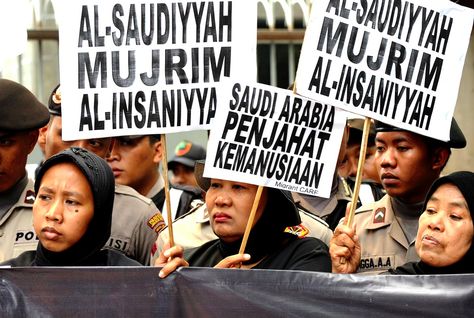
By: Hussein Shobokshi
Source: http://www.aljazeera.com/
Thousands of migrant labourers, who represent about one-third of Saudi Arabia’s 27 million people, are rushing to leave as the country’s amnesty for illegal workers expires.
The amnesty was announced on April 3, 2013, with illegal workers in the country offered the chance to get their papers in order without being penalised.
“You have two conflicting systems. You have the labour law … which is contradicted by the existence of the sponsorship system, the kafala …. Looking at the experiences that we have had in the past few days, I would say the kafala is given more credence than the labour law and that’s really the problem.” Azfar Khan, a senior migration specialist at the International Labour Organization
Because of the sheer numbers involved, the July deadline was extended to November. Those missing that new deadline now risk fines or even jail.
“I am just worried about the after-effects of the deadline – how will they be repatriated? Will they be taken to detention centres? The procedure is very cumbersome,” says Khaled al-Maeena, the editor-in-chief of the Saudi Gazette. “There are thousands of cases still pending with the passport department … and whether these people are outside the loop of the amnesty because their documents are with the government departments remains to be seen …. There is a lot of apprehension among the expatriate community here on what is going to be done tomorrow.”
About one million workers are now said to have left the country, while roughly four million are reported to have found employers to sponsor them.
Human Rights Watch (HRW) has criticised the system of sponsorship (the kafala) in Saudi Arabia and other Gulf countries, which ties migrant workers to local sponsors.
“Saudi Arabia should get serious about regularising the status of its workers and do away with an abusive labour systems that force migrants into illegal employment,” Joe Stork, the deputy director of HRW’s Middle East and North Africa division, said earlier this year.
“Migrant workers trapped in miserable job conditions or fleeing abusive situations should be able to change jobs without employer permission or government delay,” Stork added.
“The kafala system is responsible for a lot of ills going on … and is going to be on its way out …. The majority of Saudis are totally against such type of behaviour, but there are people in our society who have misused the kafala system.” Khaled al-Maeena, the editor-in-chief of the Saudi Gazette
Videos of migrant workers being beaten do surface every now and then. One such video published last week is said to show a Saudi man beating a worker who he accused of talking to his wife – prompting the Saudi government-backed Human Rights Commission to launch an investigation.
Migrant workers, mainly from India, Pakistan, Bangladesh, Sri Lanka, Nepal, Indonesia, the Philippines, Yemen, Egypt, Lebanon, and Ethiopia, are used as cheap labour and as domestic workers in Saudi Arabia and across the Gulf.
These countries rely heavily on remittances sent home by their nationals. But some workers blame their own governments for not doing enough to help them.
In June this year, Indonesian workers rioted outside their consulate in the Saudi city of Jeddah.
Saudi Arabia is the Arab world’s largest economy but the unemployment rate among nationals stands at 12.5 percent, a figure the government is trying to bring down.
So can the kingdom reduce its reliance on foreign labour? Should Saudi Arabia be looking at a broader overhaul of its labour laws? And what is Saudi Arabia doing to improve the system that created this problem?
To discuss this, Inside Story presenter Hazem Sika is joined by guests: Khaled al-Maeena, the editor-in-chief of the Saudi Gazette; Azfar Khan, a senior migration specialist at the International Labour Organization; and Hussein Shobokshi, a Saudi columnist and host of the Al Takreer current affairs programme.
“I do think now the next phase of correcting the labour laws and emphasising on the penalties and the execution of these laws plus the makeup of the Saudi employment forces are going to change. We are going to see more Saudi men and women in the workforce than before. There will be gradually more dependency on the local workforce. However, the Saudi economy will still require an international labour workforce. This situation is not going to change for the next 10 years.” Hussein Shobokshi, a Saudi columnist



